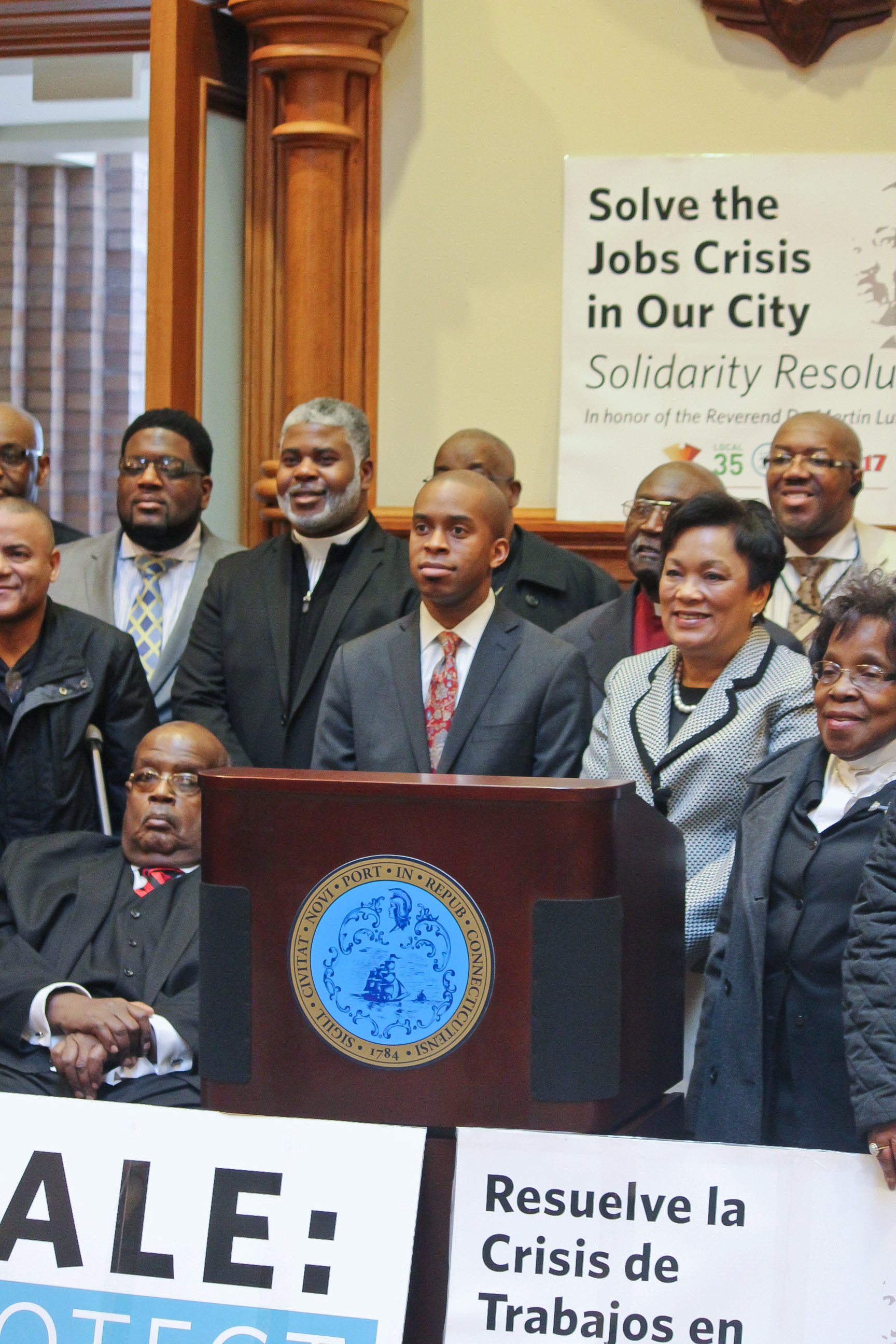
Two months after Yale promised to hire 1,000 New Haven residents over the next three years, a broad coalition of unions and community groups came together Monday afternoon to demand Yale-New Haven Hospital do its part to end the city’s “jobs crisis.”
Organized by UNITE HERE Locals 34 and 35 — the labor group that includes the unions that represent Yale’s pink- and blue-collar workers and ranks among the most powerful organizations in the city — the gathering provided a platform for the coalition to unveil a “Solidarity Resolution” urging Yale-New Haven Hospital to hire more New Haven residents. The resolution, which extensively quoted Martin Luther King Jr., demands that the hospital system dramatically increase the number of full-time hires it makes from the city’s black and Hispanic neighborhoods. Protestors cited Yale’s recent commitment as a model for the hospital to emulate. The resolution also demands that Yale allow the Graduate Employee and Students Organization to hold a vote on unionization.
Speakers at the rally, forced into City Hall by the midday rain, said the persistence of poverty and hardship in the city drove them to action.
“This is a history-making moment,” said Rev. Scott Marks, a community organizer and co-founder of union-allied activist group New Haven Rising. “And I agree with the prayer that was prayed earlier. We have many different agendas, but if there’s ever a time to come together, it’s when half of our children in this city are living in poverty.”
New Haven Rising organizer Kenneth Reveiz ’12, said the city’s scourge of poverty can no longer be ignored. In The Hill, the neighborhood bordering Yale-New Haven Hospital, nearly 50 percent of the population lives below the poverty line. Just across the street, Marna Borgstrom, CEO of Yale-New Haven, was paid $3.5 million last year.
The resolution calls on Yale to take concrete steps to respond to the jobs crisis and accuses the University of “amassing wealth” in its $25.6 billion endowment — the world’s second-largest — while ostensibly remaining a “charitable organization.”
The organizers boast what Mayor Toni Harp called a “broad-based coalition,” featuring politicians, pastors, community members, union organizers and city officials. The coalition also runs deep. The vast majority of the Board of Alders and every member of New Haven’s delegation to Hartford number among the resolution’s 200 signatories.
The activists also received the support of the mayor, who stepped out of her office to deliver remarks to the 100 people assembled in the lobby of City Hall. Harp reiterated the call for an end to the jobs crisis — but, she said, her administration must take action to do so as well.
“The City of New Haven, too, must have jobs that pay decent wages,” she said, her voice cracking as cheers drowned her out mid-sentence. Harp renewed her call for major pay increases for paraprofessionals in New Haven Public Schools — in recent weeks, she has proposed their starting annual salaries to rise from $18,000 to at least $25,000.
Near the end of the rally, GESO Chair and Wooster Square Alder Aaron Greenberg GRD ’18 said the unrecognized graduate student union has taken action in an attempt to force Yale to grant unionization, announcing that GESO has submitted its union authorization cards to Connecticut Attorney General George Jepsen to certify that they have majority support.
In tandem with GESO’s appeal to Jepsen, who spoke at GESO’s rally on Beinecke Plaza in October, Greenberg announced that UNITE HERE International Union President Donald Taylor will come to New Haven to charter Local 33, a new graduate student union. This announcement will not make GESO an official union but enable it to stylize itself more closely to the other UNITE HERE unions. Greenberg said Local 33 will hold its “founding convention” at the Omni Hotel on March 9.
Stephanie Ranks GRD ’20 — who said at the event that her working-class background has often made her feel like “the elite spaces of the University are not made for [her]” — said unionization would help teaching assistants fight pay cuts and provide graduate students with the support to push for access to mental health and sexual harassment resources.
Greenberg said GESO, after it becomes Local 33, will seek to sit down with University officials to set the terms of a unionization vote that would allow Local 33, if victorious, to negotiate a contract between graduate students and the University.
Interested in getting more news about New Haven? Join our newsletter!







